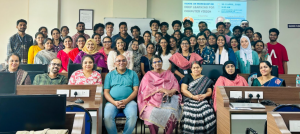
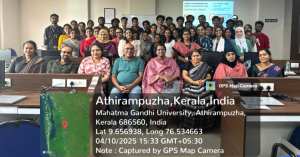
The School of Artificial Intelligence and Robotics, in collaboration with the School of Computer Sciences, Mahatma Gandhi University, Kottayam, organized a two-day Hands-on Workshop on Deep Learning for Computer Vision on the 10th and 11th of April, 2025. The event took place at the Artificial Intelligence and Deep Learning Lab, located within the School of Artificial Intelligence and Robotics. The workshop was conducted under the auspices of the MGU ACM Student Chapter and witnessed enthusiastic participation from postgraduate students, research scholars, and faculty members.
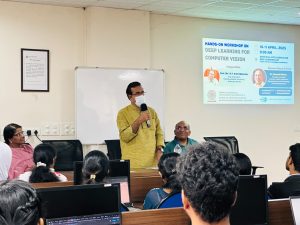
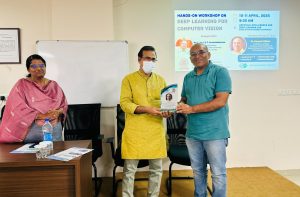
The workshop commenced with an official inauguration ceremony held on April 10th at 9:30 AM. The session was gracefully anchored by Sreelakshmi, a student of M.Sc. Artificial Intelligence and Robotics. The inaugural address was delivered by Prof. (Dr.) C.T. Aravindakumar, Honourable Vice-Chancellor of Mahatma Gandhi University. His presence and encouraging words marked a grand opening for the workshop, highlighting the growing relevance of Artificial Intelligence and its real-world applications, particularly in the domain of computer vision.
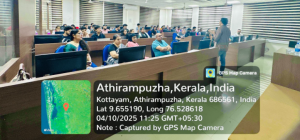
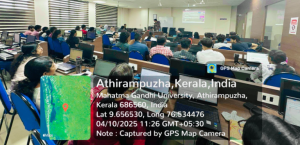
The welcome speech was presented by Prof. Dr. Bindu V R, Head of the School of Computer Sciences. She emphasized the importance of staying updated with technological advancements and fostering interdisciplinary learning. As a gesture of appreciation, a memento was presented to the resource person, Dr. Deepak Mishra, by the Vice-Chancellor. The inauguration ceremony concluded with a vote of thanks by Asst. Prof. Blessy Paul P, expressing gratitude to all dignitaries, participants, and organizing team members for their contributions.
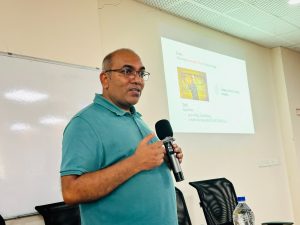
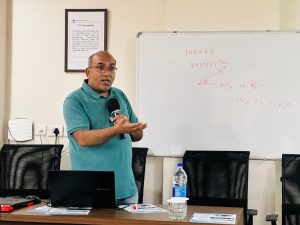
Dr. Deepak Mishra, Professor, IIST
The primary resource person for the workshop was Dr. Deepak Mishra, Professor and Head of the Department of Avionics at the Indian Institute of Space Science and Technology (IIST), Thiruvananthapuram. Dr. Mishra, renowned for his expertise in AI and computer vision, led several sessions along with a dedicated team comprising Jayakumar T V, Aswathy P, Krishnendu Lalaji, and Ramzan Basheer.
The first technical session, titled “Introduction to CNNs & Image Classification”, was conducted by Jayakumar T V and Aswathy P. This session laid the groundwork for understanding Convolutional Neural Networks (CNNs), focusing on the evolution of computer vision from traditional methods to deep learning-based approaches. Participants learned about key visual features such as edges, corners, colors, and shapes, and how CNNs are utilized to automatically extract these features.
The second session on “Transfer Learning and Fine-Tuning” was handled by Krishnendu Lalaji and Jayakumar T V. This segment introduced the practical aspects of reusing pre-trained models for custom tasks. Concepts like feature extraction layers, model freezing, and re-training strategies were thoroughly explained with live demonstrations.
Post-lunch, Dr. Deepak Mishra and Ramzan Basheer conducted a session on “Advanced Architectures”. Participants were exposed to cutting-edge deep learning frameworks, modifications of CNNs, and practical insights on enhancing model performance. The session effectively bridged foundational concepts with modern implementations.
The final session of the day, “Generative Models (GANs and VAEs)”, was jointly presented by Dr. Deepak Mishra and Krishnendu Lalaji. They introduced Generative Adversarial Networks (GANs), their various forms through the-gan-zoo, and how they differ from Variational Autoencoders (VAEs). Important concepts such as noise injection, latent space representation, and the reparameterization trick were discussed. Participants also learned how VAEs model data variance and perform efficient backpropagation.
The day concluded with a feedback session led by Nisha Shamsudin, a research scholar from the School of Computer Sciences. She praised the well-organized structure of the sessions and appreciated the balance between theoretical insights and hands-on exercises.
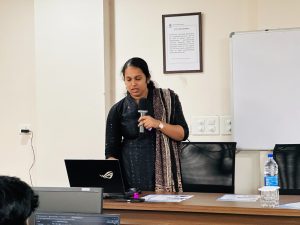
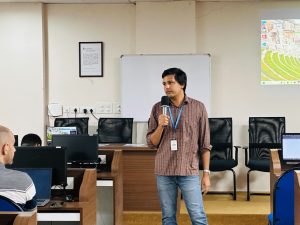
The second day opened with an engaging session on “Object Detection, Segmentation, and Tracking” by Aswathy P and Krishnendu Lalaji. This session explored modern object detection frameworks and how segmentation techniques help machines understand pixel-level classification. Tools and models for real-time tracking were also introduced, giving participants a comprehensive understanding of visual recognition systems.
The final session of the workshop focused on “Graph Neural Networks (GNNs) for Vision”, led by Ramzan Basheer and Aswathy P. This advanced session introduced the idea of performing convolutions not just on regular image grids but also on graph-structured data. The speakers highlighted how visual data can be projected into graph structures, allowing for spatial and relational learning. Topics like embedding, transformation, and projection of data were discussed, followed by examples of GNNs used in computer vision tasks. Throughout both days, participants gained valuable insights into not just the foundational techniques but also the evolution and future directions of computer vision and deep learning. Several advanced topics such as diffusion models, autoencoders, conditional generation, and noise-removal architectures were discussed. Diffusion models, in particular, were praised for their ability to generate highly realistic images by simulating a process of noise addition and removal — a strategy inspired by natural diffusion from high to low concentration.
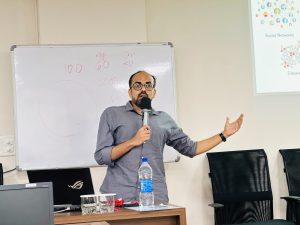
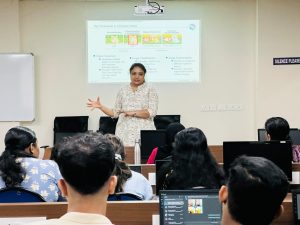
Datasets like Moments in Time and platforms like Papers with Code were introduced for further exploration. The speakers encouraged participants to explore research papers and experiment with implementations using these resources. The workshop concluded with a final feedback session where participants Febin (1st-year MSc, SOCS), Fidha (2nd-year MSc, SAIR), and Mehanas Shahul (Research Scholar, SOCS) shared their reflections. All expressed deep satisfaction with the structure, delivery, and content of the sessions, appreciating the theoretical clarity, practical demonstrations, and the accessibility of complex concepts.
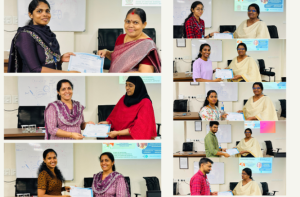
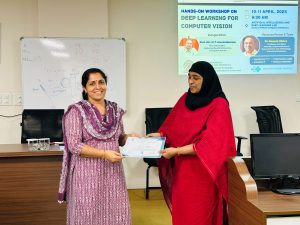
Certificate distribution was held at the end of the workshop, marking the successful completion of the two-day event.